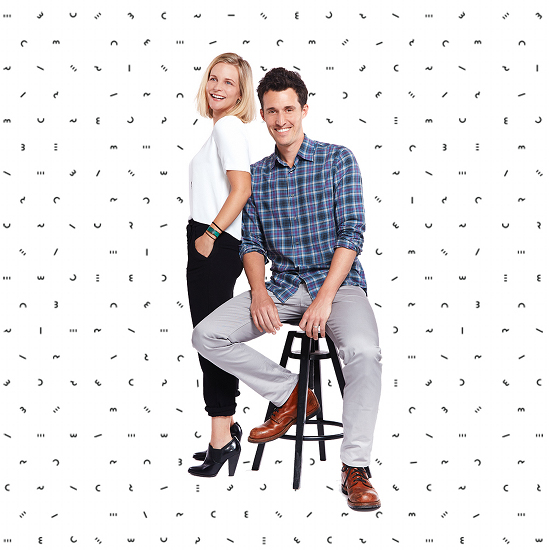
5 Minutes with… The Bozzwicks

The Bozzwicks are a pretty impressive twosome. Michael Bozzo and Justine Warwick are a duo who direct, shoot and edit their own films – and they also happen to be married. Michael cut his teeth as a DOP, while Justine has an esteemed career as an editor. But after meeting through a mutual friend the pair hit it off emotionally and creatively – and decided to pool their skills. Their films are firmly rooted in real life and they’ve built up an impressive body of sports work for brands such as HBO, Showtime, NBC Sports and Sports Illustrated. Neither much of a sports fan, it’s their knack for bringing the stories behind the game to life with emotionally charged storytelling that’s so coveted. They’ve recently signed for representation with Derby - LBB’s Addison Capper chatted with them to find out more.
LBB> You guys are a married couple, so could you give us a bit of background into how you met and what inspired you to start working together?
Justine> I was working in TV and a colleague left the company and joined a place where Mike was working. She liked him and said he reminded her of me. She wanted us to meet and we both said ‘no’ for over a year. We were wary of meeting someone through work. But eventually we met up and it was great.
Michael> And we actually started working properly together a little after that. There was a project that I was shooting and Justine was editing. It was a sports feature series, so it involved a lot of little films - and we thought, wouldn’t it be interesting if we directed one of these together? So, we spoke to the executive producer and they gave us one. It started with that and we just took it from there.
Justine> I used to shoot and produce before I began editing, but I chose editing because I found that I had the most fun doing that. But after years and years of doing it, I missed going out and helping craft the story. This opportunity came along and it went really well; I really enjoyed stepping out of the edit and going back to where I came from. And we worked well together and enjoyed working together. That’s the main thing.
LBB> How did you get into what you do? Was it more a plan or happy accident?
Justine> I was one of those weird freaky people that knew what they wanted to do when they were eight years old, despite not even knowing the job existed. I started taking photos when I was a kid, I would steal my father’s camera. That led into photography, which led into editing those photos. Then there was a teacher in 10th grade that suggested I might like film. I started editing film when I was 15 and I’ve always enjoyed it. There was a little local place that had an Avid, so I taught myself that.
Music videos were a big catalyst for me. I would always come home from school and watch MTV and they enthralled me. I didn’t know how to do it, but I wanted to make them. I didn’t want to be in a band or be a singer - I wanted to make music videos.
Michael> I was also really into music videos. There were also a few production classes that I did at school, and I was always very much into it but I never thought that you could actually do it professionally. I went to university and took a much more traditionally business focused path, but it was miserable and I hated everything about it. I switched to do film… which my parents were not psyched about at all.
LBB> You are obviously very comfortable in each other’s company - do you think that has a positive effect on your creative output?
Justine> Yeah, I do. We don’t have to talk about things too much. It’s hard to describe. We both tend to feel the same way, but with different qualities. Mike brings to the table the ‘how’, the ‘when’ and the choice of shot. I am more focused on making sure we get x, y and z to ensure we can tell the story properly. We always tend to agree and if we do disagree on something it’s usually about a certain small thing - for example, how to make something happen - instead of the overall idea. And usually in that case we just shoot it twice! But for the most part, it’s a very natural process.

LBB> And when you’re both on set, do you both assume quite different roles?
Michael> Yes and no. Because we have different backgrounds we do have slightly different approaches to telling stories. We’re able to complement each other in a unique way.
Justine> Before we begin a project we’ll talk about it a lot. Not the editing or the shooting aspect, we’ll just talk about the overall project. The mood, the emotion, what we want to convey, who the audience is.
But when we’re on set, Mike shoots most of our stuff, so he is naturally more focused on the framing and the job of the cinematographer. I’m more focused on the directorial and editorial brain and making sure that I’ve got everything right for the edit. Throughout the day we almost naturally check in with each other every hour or so. So it’s slightly separated because with Mike being DP it takes up a lot of his head space to make sure everything is beautiful.
But then when we get into the edit room it flips, because I’m more involved with the nitty gritty. Then Mike has the ability to step in and suggest trying different things, much like it also works on set but vice versa. So, Mike has the clearer brain while I’m editing, while I’d say that I have more freedom to see the big picture on set while he’s shooting.
LBB> Justine, you edit all of the work that you both direct. I hear a lot of stories of directors that edit their own, and they really struggle doing so. Actually saying, “this is finished” and stopping working tends to be the trickiest thing to do. Do you encounter that problem?
Justine> Absolutely. It’s never finished. I still look at things that I did years ago and cringe. But now that I’m getting a bit older, I’m finally becoming more comfortable with my older work. But I don’t think any editor is ever really ‘done’. And it is problematic sometimes.
There was a time when we considered hiring another editor or I’ve reached out to some of my mentors to get them to take a look, because I am too close to it. To be on set and see how long a certain shot took to capture, with Michael hanging off the side of a cliff or something, can lead to an emotional connection! So we’ll get that third opinion if needs be. But I am very wary of this situation and I pull back to tell the story in the best way.
LBB> Mike, you’ve worked as a DOP for many years and I know that the job has taken you to some particularly tricky situations. Which is the trickiest and why?
Michael> Sometimes the seemingly easy ones are the trickiest! But the most infamous and gruelling shoot was one that I did in the Amazon for over two months for the History Channel. On every level that was a tough shoot, from the lack of production support that we had to just being in the very unforgiving jungle.
Psychologically, to work in a place where there is literally the threat of death looming over us, was interesting. There were snakes that fell from trees and if one bit you, you’d die in 45 minutes. And we didn’t have the correct anti-venom. There were obviously no roads, so we were hacking our way through the bush with machetes, while carrying a lot of crazy camera equipment, and having to look in all directions at all times. It was an interesting one, and by the end of it we were all a bit insane. On the first day I was head to toe in proper gear, long pants, a hat, scarf - everything you need to protect yourself from the elements. By the end of it I was barefoot, wearing nothing but a bathing suit with a camera on my shoulder. We actually spoke with the guys that made Planet Earth before going down there and they said that by far the hardest environment to shoot in is the jungle. And they’re not wrong.
LBB> A lot of your work as directors is very much rooted in real life. Why do you enjoy working with this type of content?
Justine> I don’t know if I’ve ever thought about that. I’ve worked across a lot of different mediums and genres, and for me it’s the most rewarding. They’re real people and most of the time I can find a little bit of myself in their stories. And when I can relate to something I enjoy working on it more. Even though it’s just for a short while, these people are letting you into their lives - and that feels pretty special. I think that connection is why.
Michael> I started in sports documentaries despite not being a big sports player or fan even. But I was just drawn to the individual stories. Sports, no matter the level, are always full of high drama amongst the individual people competing. It was through that genre that I discovered authentic stories and I’ve always been drawn to them since.
LBB> So what are the tricks to making work like that? A lot of the time you will be working with people that aren’t actors, but you still need to get a performance, so to speak, out of them…
Michael> As Justine mentioned earlier, we speak a lot before productions. The more planning that we do allows us to explore and open ourselves up to find magical moments on set.
Justine> Yeah the pre-production is essential here. On pretty much every shoot there will be something that someone reveals in an interview or some other type of magical moment - and if we’ve planned well enough, then we’ll be free enough to go and grab them. It’s also really important to get to know these people and explain to them how you’re going to paint them, so that they feel more at ease in front of the camera. If they do that then they tend to open up a lot more in a conversational style. It’s really a case of trust.













